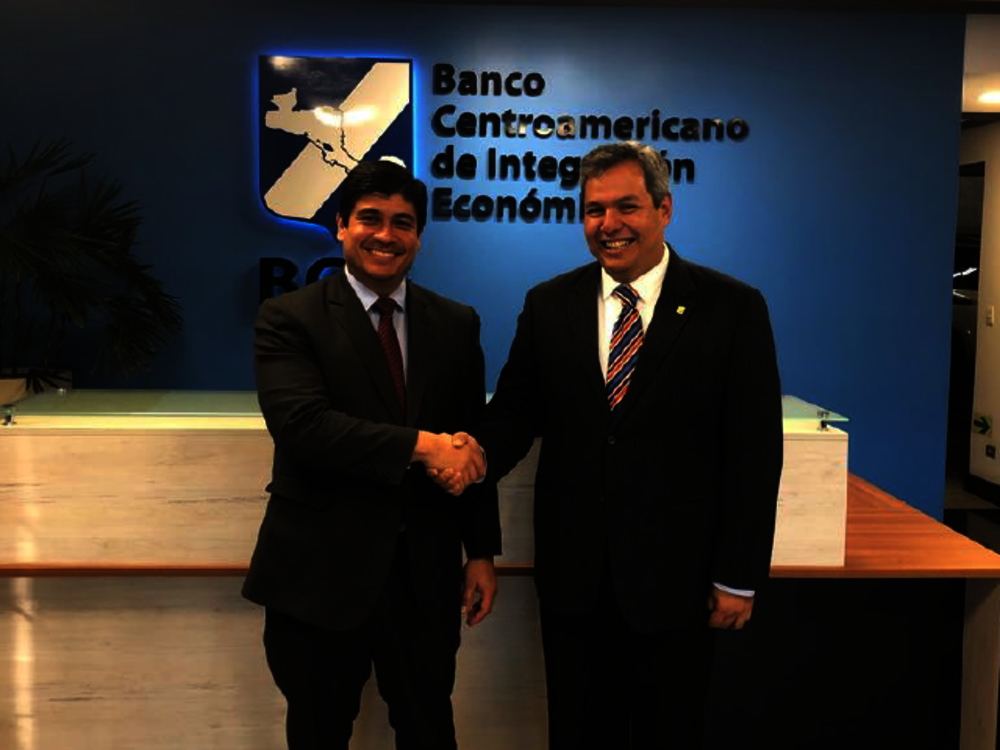CABEI Executive President visits Costa Rica

CABEI's investment in the development of Costa Rica includes infrastructure work in the road network, aqueducts and sanitation, hospital network, railroads, energy matrix, insurance, public banking, educational system and universities.
San José, February 6, 2019 (AFP SERVICES/CABEI).- The arrival in Costa Rica of the Executive President of the Central American Bank for Economic Integration (CABEI), Dr. Dante Mossi, has been very well received by the high governmental authorities. The visit, which began on February 4 and ended today, included a courtesy visit to the Costa Rican President, Carlos Alvarado Quesada, with the aim of analyzing the economic and social development initiatives that the Bank supports in the country.
During the visit to the Presidential House, a meeting was held with the macroenomic team of the Government of Costa Rica, the Minister of Finance, the President of the Central Bank and the President of the Joint Institute of Social Assistance where they discussed relevant aspects of the current situation regarding economic and social issues. President Mossi took advantage of the opportunity to be in a country where the environment is a priority to make known that the CABEI Board of Directors approved the Initiative for Productive Investments Adapting to Climate Change (CAMBio II), which seeks to increase access to resources for Micro, Small and Medium Enterprises (MSMEs) in order to apply climate change adaptation measures.
Subsequently, President Mossi met for more than two hours at the Bank's offices with the Costa Rican President, Carlos Alvarado, and a group of representatives from autonomous ministries and institutions that are clients of the Bank. At the meeting, President Mossi reiterated that, "I want to listen and understand about ways in which CABEI can be more useful for this country, which is the most important client for CABEI throughout region. The Bank is carrying out significantly diverse financing in Costa Rica, which is why I am investing part of my time to get to know the authorities directly in order to know the needs and projects that could be carried out as strategic partners in benefit of the population."
Positive experience
The President of Costa Rica, Carlos Alvarado, assured that his experience with CABEI has been very positive, and showed great interest in continuing to work together, stating that, "In particular, I like the agility with which things are done at CABEI, as well as its ability to innovate, which prevents important delays in the actions to be taken. We are discussing development works in different areas, such as: aqueducts and sanitation, hospital network, railroads, issues of the energy matrix, insurance, public banking, educational system and universities.” 70% of the credit portfolio managed by CABEI with the State has as a counterpart with autonomous institutions.
In the case of the Costa Rican Institute of Aqueducts and Sewers, AyA, the Bank's support has been fundamental. For AyA Executive President, Yamileth Astorga, all of the country's water supply systems that have reached the end of their useful life must be attended, which requires new credits. Furthermore, there is a project to grant water capacity to the metropolitan area; the project involves the provision of 2.5 cubic meters of water per second with an investment of US$350 million dollars. The total, adding other credits, amounts to approximately $1.00 billion dollars. CABEI has become a strategic ally for the president of AYA, who added that, "Without the investments, ease of conditions and general support provided by the Bank, the development of the country could be affected to the point of paralysis."
In matters of train transportation, the President of the Costa Rican Railway Institute (INCOFER), Elizabeth Briceño, expressed satisfaction with the current relationship with the Bank and its support provided in two national projects: the electric train of the Greater Metropolitan Area (GAM); and, working jointly with the Costa Rican Electricity Institute (ICE), the Limonense Electric Freight Train (TELCA), whose main characteristic involves moving from a petroleum-based energy matrix to a matrix produced from clean energies. Ms. Briceño commented that, "The synergy achieved with the CABEI representatives and our executing unit, as well as the unrestricted support of the Government, have been essential to move forward with firm steps towards the proposed goals."
For its part, the Executive President of the Costa Rican Electricity Institute (ICE), Irene Cañas, indicated that the deal with CABEI dates back many years, implementing hydroelectric, geothermal, and wind projects, which have been very beneficial for providing progress to the entire nation. For her, the relationship with the Bank in the current era must be a challenge based on the need to jointly seek ways to reinvent oneself and create new businesses as partners. This will undoubtedly require new investments and new financing schemes. Ms. Cañas said that, "Looking for solutions to positively impact the electricity tariff is a priority for attracting more investment and additional sources of employment, hence the importance of renewing and reinventing ourselves."
Impact Works
As part of the visit, Dr. Mossi toured projects in which the Bank provides support, including a visit to the railway project of TELCA, which aims to modernize the current infrastructure of cargo transport to the Port of Moin in the Atlantic with electrical technology. Likewise, he visited the aqueducts project in Atenas, which seeks to improve the infrastructure to provide potable water and improvements to the wastewater treatment system. He also visited the Circunvalación project, whose objective is the rehabilitation of bridges and improvements at strategic points for decongesting traffic. The tour concluded with a visit to the National Theater project where actions of Security and Conservation of the Historical Monument are being carried out.
The visit to Costa Rica is part of the efforts to broaden and deepen CABEI's relations as the main financial agent of the region. CABEI is currently the main multilateral bank in the region and the financial arm of Central American integration, in addition to being the main channeler of external funds for development projects in the region.







